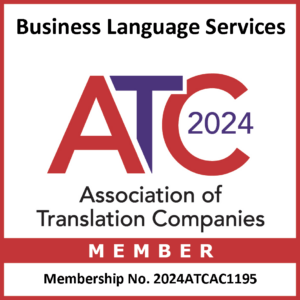Expert language services for global communication success
At Business Language Services, we have been providing reliable, top‑quality translations for companies, charities and public‑sector organisations for over 30 years.
From subtitling to marketing translation, interpreting to desktop publishing, we offer a broad range of language services for businesses and enterprises, allowing you to communicate effectively and easily with your clients and colleagues all around the world.
Our team of linguists and project managers are all experts in their field. All our translators translate exclusively into their native language, and only in subject areas in which they are experienced, ensuring that all their translations are culturally and contextually appropriate.
We also make use of industry‑leading technology, including computer‑assisted translation (CAT) tools, AI and machine translation systems, specialist desktop publishing programs, and many more.


Our Language Services for Businesses
We can assist your business with a wide range of language-related projects.
Here are just some of our specialisms:
Serving a Range of Industries
Our expert linguists specialise in various sectors, from technical and medical translations to creative marketing content,
ensuring your multilingual materials are tailored to your audience with a quality-focused approach.
Pricing and turnaround times
Prices and turnaround times depend on many factors. We will always establish your exact requirements at the outset and provide a personalised quote breaking down the costs and turnaround times for your project.
The three main factors that affect costs and turnaround times are:
- Number of languages
- Word count (text) or duration (audio/video)
- Service(s) requested
In one working day, our linguists can typically translate, edit and proofread around 1,500–2,000 words, although this can vary depending on the complexity of the text. If multiple languages are needed, this will slightly increase the time needed, typically by around one day.
For subtitling, you can generally multiply the duration of the video by a factor of 10 to estimate the time it will take to subtitle – for example, a 10‑minute video will take around 100 minutes to fully subtitle.
Turnaround times for services such as transcription and desktop publishing vary depending on the complexity of the task.
Use our online quote form or speak to one of the team for a quote tailored to your needs.


We provide language services for nearly every language
We have expert linguists for just about all languages used today – from Arabic to Zulu, and everything in between.
Our top 10 most requested languages for certified translations are:


Memberships and Accreditations
We are members of various professional organisations in the translation industry and beyond, including:
Accredited Member of the Association of Translation Companies (ATC) – The ATC is one of the three translation industry bodies in the UK, and our accredited member status allows us to certify translations of official legal documents, such as birth and death certificates, marriage and divorce documents, and many others.
Corporate Member of the Institute of Translation and Interpreting (ITI) – The ITI is another of the three translation industry bodies in the UK, each of whose practices are endorsed by the others.
ISO 9001:2015 certification – our Quality Management ISO certification benefits us as a company and our clients, through increased efficiency, continuous improvement, quality assurance, a factual approach to decision-making, improved record keeping, quality of service and relationships with suppliers and clients. It ensures consistency in our processes so that you, as our client, can be assured that our services will meet your needs.